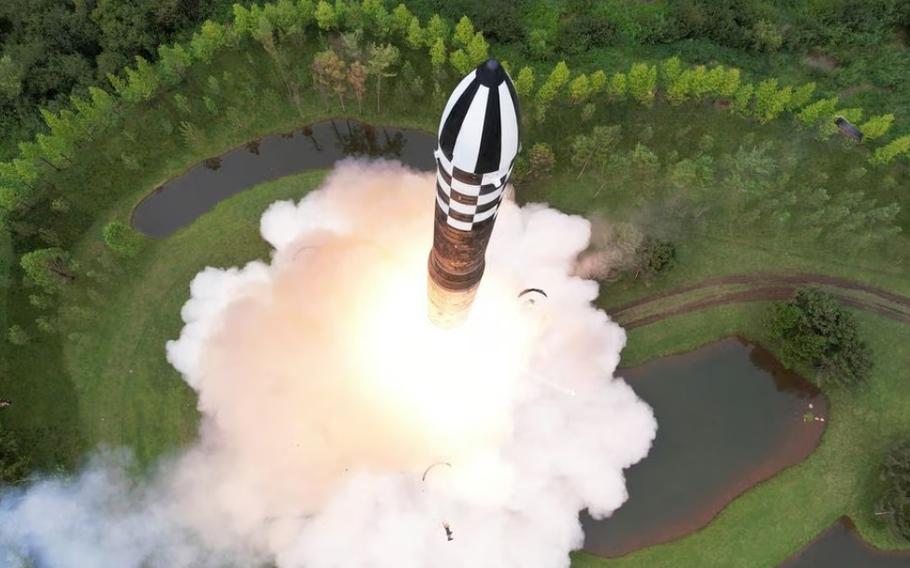
North Korea launches a Hwasong-18 intercontinental ballistic missile in this image released by the state-run Korean Central News Agency, Thursday, July 13, 2023. (KCNA)
CAMP HUMPHREYS, South Korea — North Korea on Thursday said the intercontinental ballistic missile it tested the previous day flew 74 minutes, a new record for the regime’s missile program.
North Korean leader Kim Jong Un oversaw the test of a Hwasong-18, which “fully demonstrated the might” of the regime, said the state-run Korean Central News Agency. The North last fired a Hwasong-18 on April 13.
Kim said the political climate on the Korean Peninsula was unstable and called for North Korea to bolster its nuclear war deterrent, according to KCNA.
He has called the Hwasong-18 the most powerful weapon of his nuclear forces.
North Korea will not break from its series of weapon tests, the KCNA report said, and Kim ordered the government “to steadily accelerate the development of more … effective and reliable weapon [systems].”
The missile’s built-in solid propellant makes it more difficult for opponents to detect launches in advance and can be fired quicker compared to liquid-fueled missiles.
The North has been developing solid-fuel missiles since 2019 to replace its older, liquid-fueled inventory, South Korea’s Ministry of National Defense said in its annual readiness report in February.
The ICBM was launched just before 10 a.m. Wednesday from the Pyongyang area and flew about 620 miles before splashing down in the Sea of Japan, or the East Sea, according to South Korea’s Joint Chiefs of Staff.
Japan’s military said the missile was fired at 9:59 a.m. and flew 74 minutes before splashing down 155 miles west of Okushiri Island, outside the country’s exclusive economic zone, Chief Cabinet Secretary Hirokazu Matsuno said Wednesday.
The missile flew at a maximum altitude of 3,730 miles, Matsuno said. No damage was reported.
Wednesday’s test is a “significant” indication that the Hwasong-18 could theoretically reach the United States, according to Yang Uk, an associated research fellow at the Asan Institute for Policy Studies in Seoul.
But it is still unclear whether the missile was carrying a simulated payload, a crucial factor in determining an ICBM’s capability, Yang told Stars and Stripes by phone Thursday.
“In this [KCNA] announcement, there’s no comment on the payload.” Yang said. “You can call it a success, but that doesn’t mean that the whole system is operational.”
The ICBM was fired nearly 1 ½ months after North Korea attempted on May 31 to launch what it called a surveillance satellite. The rocket failed and the vehicle fell into the Yellow Sea, where it was recovered by South Korea. The regime promised another attempt soon.
North Korea’s latest test was a response to its belief that the U.S. and South Korea violated the country’s airspace on multiple occasions, according to KCNA’s report on Thursday.
Pyongyang alleged that the U.S.’s crewed RC-135 and unmanned RQ-Global Hawk aircraft violated its maritime airspace between July 2 and Friday, and threatened it may shoot down the aircraft in the future, KCNA reported Monday.
South Korea’s military and the U.S. State Department denied its joint aerial surveillance operations had violated the North’s airspace.
The Joint Chiefs of Staff from the U.S., Japan and South Korea had a discussion immediately following Wednesday’s launch, South Korean Joint Chiefs of Staff spokesman Lee Sung-jun told reporters during a news briefing in Seoul on Thursday.
South Korean President Yoon Suk Yeol and Japanese Prime Minister Fumio Kishida, who were in Vilnius, Lithuania, for a NATO summit on Wednesday, released a joint statement with Australian Prime Minister Anthony Albanese and New Zealand Prime Minister Chris Hipkins condemning the North’s launch that day.
“The four countries solely oppose North Korea’s unlawful provocation and urge it to fully comply with all of its obligations under the relevant U.N. Security Council resolution,” the statement said. “Even if North Korea continues to develop its nuclear and missile programs and threaten the use of nuclear weapons, it will only bolster the international community’s resolve to achieve [the] complete denuclearization of North Korea.”
The U.N. Security Council has banned ballistic missile tests by North Korea since 2006.